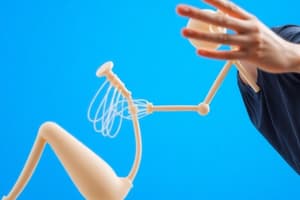Podcast
Questions and Answers
What is the process by which the brain, spinal cord, and muscles work together to produce movement?
What is the process by which the brain, spinal cord, and muscles work together to produce movement?
- Muscle activation
- Neuromuscular coordination (correct)
- Motor learning
- Movement planning
Which aspect of human motor control involves the process of improving motor skills?
Which aspect of human motor control involves the process of improving motor skills?
- Movement planning
- Muscle activation
- Joint stability
- Motor learning (correct)
What function does the neuromuscular system play in maintaining joint stability?
What function does the neuromuscular system play in maintaining joint stability?
- Motor learning
- Muscle activation (correct)
- Joint stability
- Posture and balance
Which system helps maintain posture and balance by coordinating muscle contractions and activating the appropriate muscles?
Which system helps maintain posture and balance by coordinating muscle contractions and activating the appropriate muscles?
What is one of the key aspects of motor learning?
What is one of the key aspects of motor learning?
Which process involves the selection and prioritization of appropriate motor skills for a given task?
Which process involves the selection and prioritization of appropriate motor skills for a given task?
What is involved in the decision-making aspect of movement planning?
What is involved in the decision-making aspect of movement planning?
Which of the following is a key aspect of motor learning that helps individuals understand the results of their movements?
Which of the following is a key aspect of motor learning that helps individuals understand the results of their movements?
What role does neural plasticity play in motor learning?
What role does neural plasticity play in motor learning?
Which process involves the integration of sensory information, motor skills, and decision-making processes?
Which process involves the integration of sensory information, motor skills, and decision-making processes?
Flashcards are hidden until you start studying
Study Notes
Human Motor Control
Introduction
Human motor control is the process by which the brain, spinal cord, and muscles work together to produce movement. It is a complex system that allows us to perform a wide range of movements, from simple tasks like picking up an object to more complex activities like playing a musical instrument or participating in sports. In this article, we will explore three key aspects of human motor control: neuromuscular coordination, motor learning, and movement planning.
Neuromuscular Coordination
Neuromuscular coordination is the process by which the brain, spinal cord, and muscles work together to produce movement. It involves the coordination of muscle contractions and neural signals to produce smooth, controlled movements. The neuromuscular system is responsible for several functions, including:
-
Muscle activation: The brain sends signals through the spinal cord to activate muscles, causing them to contract and produce movement.
-
Joint stability: The nervous system also plays a role in maintaining joint stability, as it sends signals to muscles around a joint to help keep it stable and prevent injury.
-
Posture and balance: The neuromuscular system helps maintain posture and balance by coordinating muscle contractions and activating the appropriate muscles to maintain a stable body position.
Motor Learning
Motor learning is the process by which the brain learns to control movements and improve motor skills. It involves the formation of new neural pathways in the brain, allowing for more efficient and accurate movement over time. Key aspects of motor learning include:
-
Practice: Motor learning requires repeated practice to improve performance and develop new motor skills.
-
Feedback: Feedback is an essential component of motor learning, as it helps individuals understand the results of their movements and adjust their actions accordingly.
-
Neural plasticity: Motor learning involves changes in neural connections in the brain, leading to improved motor skills and coordination.
Movement Planning
Movement planning is the process by which the brain selects and prioritizes the appropriate motor skills for a given task. It involves the integration of sensory information, motor skills, and decision-making processes. Key aspects of movement planning include:
-
Sensory input: The brain receives sensory information from the environment and the body, which is used to plan and execute movements.
-
Motor skills: The brain selects and prioritizes the appropriate motor skills based on the task at hand.
-
Decision-making: Movement planning also involves making decisions about which motor skills to use and how to prioritize them to achieve the desired outcome.
In conclusion, human motor control is a complex system that involves the coordination of muscle contractions, neural signals, and sensory information to produce smooth, controlled movements. Motor learning and movement planning play a crucial role in developing and refining motor skills, allowing us to perform a wide range of tasks efficiently and effectively.
Studying That Suits You
Use AI to generate personalized quizzes and flashcards to suit your learning preferences.




